- Home
- Margaret Atwood
Surfacing Page 6
Surfacing Read online
Page 6
When I started school myself I begged to be allowed to go to Sunday School, like everyone else; I wanted to find out, also I wanted to be less conspicuous. My father didn't approve, he reacted as though I'd asked to go to a pool hall: Christianity was something he'd escaped from, he wished to protect us from its distortions. But after a couple of years he decided I was old enough, I could see for myself, reason would defend me.
I knew what you wore, itchy white stockings and a hat and gloves; I went with one of the girls from school whose family took a pursed-mouth missionary interest in me. It was a United Church, it stood on a long grey street of block-shaped buildings. On the steeple instead of a cross there was a thing like an onion going around which they said was a ventilator, and inside it smelled of face powder and damp wool trousers. The Sunday School part was in the cellar; it had blackboards like a regular school, with KICKAPOO JOY JUICE printed on one of them in orange chalk and underneath, in green chalk, the mysterious initials C.G.I.T. This was a possible clue, until they translated it for me, Canadian Girls In Training. The teacher wore maroon nail-polish and a blue pancake-sized hat clipped to her head by two prongs; she told us a lot about her admirers and their cars. At the end she handed out pictures of Jesus, who didn't have thorns and ribs but was alive and draped in a bed sheet, tired-looking, surely incapable of miracles.
After church every time, the family I went with drove to a hill above the railway terminal to watch the trains shunting back and forth; it was their Sunday treat. Then they would have me to lunch, which was always the same thing, pork and beans and canned pineapple for dessert. At the beginning the father would say Grace, "For what we are about to receive may the Lord make us truly thankful, Amen," while the four children pinched and kicked each other under the table; and at the end he would say,
Pork and beans the musical fruit,
The more you eat the more you toot.
The mother, who had a bun of greying hair and prickles around her mouth like a schmoo, would frown and ask me what I'd learned about Jesus that morning, and the father would grin feebly, ignored by all; he was a clerk in a bank, the Sunday trains his only diversion, the little rhyme his only impropriety. For some time I had a confused notion that canned pineapple really was musical and would make you sing better, until my brother set me straight.
"Maybe I'll be a Catholic," I said to my brother; I was afraid to say it to my parents.
"Catholics are crazy," he said. The Catholics went to a school down the street from ours and the boys threw snowballs at them in winter and rocks in spring and fall. "They believe in the B.V.M."
I didn't know what that was and neither did he, so he said "They believe if you don't go to Mass you'll turn into a wolf."
"Will you?" I said.
"We don't go," he said, "and we haven't."
Maybe that's why they didn't waste any sweat searching for my father, they were afraid to, they thought he'd turned into a wolf; he'd be a prime candidate since he never went to Mass at all. Les maudits anglais, the damned English, they mean it; they're sure we're all damned literally. There should be a loup-garou story in Quebec Folk Tales, perhaps there was and Mr. Percival took it out, it was too rough for him. But in some of the stories they do it the other way round, the animals are human inside and they take their fur skins off as easily as getting undressed.
I remember the hair on Joe's back, vestigial, like appendices and little toes: soon we'll evolve into total baldness. I like the hair though, and the heavy teeth, thick shoulders, unexpectedly slight hips, hands whose texture I can still feel on my skin, roughened and leathery from the clay. Everything I value about him seems to be physical: the rest is either unknown, disagreeable or ridiculous. I don't care much for his temperament, which alternates between surliness and gloom, or for the overgrown pots he throws so skilfully on the wheel and then mutilates, cutting holes in them, strangling them, slashing them open. That's unfair, he never uses a knife, only his fingers, and a lot of the time he only bends them, doubles them over; even so they have a disagreeable mutant quality. Nobody else admires them either: the aspiring housewives he teaches two evenings a week, Pottery and Ceramics 432-A, want to make ashtrays and plates with cheerful daisies on them instead, and the things don't sell at all in the few handicraft shops that will even stock them. So they accumulate in our already cluttered basement apartment like fragmentary memories or murder victims. I can't even put flowers in them, the water would run out through the rips. Their only function is to uphold Joe's unvoiced claim to superior artistic seriousness: every time I sell a poster design or get a new commission he mangles another pot.
I wanted my third princess to be running lightly through a meadow but the paper's too wet, she gets out of control, sprouting an enormous rear; I try to salvage it by turning it into a bustle, but it's not convincing. I give up and doodle, adding fangs and a moustache, surrounding her with moons and fish and a wolf with bristling hackles and a snarl; but that doesn't work either, it's more like an overweight collie. What's the alternative to princesses, what else will parents buy for their children? Humanoid bears and talking pigs, Protestant choo-choo trains who make the grade and become successful.
Perhaps it's not only his body I like, perhaps it's his failure; that also has a kind of purity.
I crumple up my third princess, dump the paint water into the slop pail and clean the brushes. I survey from the windows: David and Joe are still out on the lake but they seem to be heading back now. Anna is halfway up the hillside stairs, towel over her arm. I see her for a moment faceted by the screen door and then she's inside.
"Hi," she says, "get anything done?"
"Not much," I say.
She comes over to the table and smooths out my botched princesses. "That's good," she says without conviction.
"Those are mistakes," I say.
"Oh." She turns the sheets over, face down. "Did you believe that stuff when you were little?" she says. "I did, I thought I was really a princess and I'd end up living in a castle. They shouldn't let kids have stuff like that." She goes to the mirror, blots and smooths her face, then stands on tiptoe, checking her back to see if it's pink. "What was he doing up here?" she asks suddenly.
It takes me a moment to understand what she means. My father, his work. "I don't know," I say, "Just, you know."
She gives me an odd glance, as though I've violated a propriety, and I'm puzzled, she told me once you shouldn't define yourself by your job but by who you are. When they ask her what she does she talks about fluidity and Being rather than Doing; though if she doesn't like the person she just says "I'm David's wife."
"He was living," I say. This is almost right, it satisfies her, she goes into the bedroom to change her clothes.
All at once I'm furious with him for vanishing like this, unresolved, leaving me with no answers to give them when they ask. If he was going to die he should have done it visibly, out in the open, so they could mark him with a stone and get it over with.
They must find it strange, a man his age staying alone the whole winter in a cabin ten miles from nowhere; I never questioned it, to me it was logical. They always intended to move here permanently as soon as they could, when he retired: isolation was to him desirable. He didn't dislike people, he merely found them irrational; animals, he said, were more consistent, their behaviour at least was predictable. To him that's what Hitler exemplified: not the triumph of evil but the failure of reason. He found war irrational too, both of my parents were pacifists, but he would have fought anyway, in defence of science perhaps, if he'd been permitted; this must be the only country where a botanist can be classified as crucial to the national defense.
As it was he withdrew; we could have lived all year in the company town but he split us between two anonymities, the city and the bush. In the city we lived in a succession of apartments and in the bush he picked the most remote lake he could find, when my brother was born there wasn't yet a road to it. Even the village had too many people for him,
he needed an island, a place where he could recreate not the settled farm life of his own father but that of the earliest ones who arrived when there was nothing but forest and no ideologies but the ones they brought with them. When they say Freedom they never quite mean it, what they mean is freedom from interference.
The stack of papers is still up on the shelf by the lamp. I've been avoiding it, looking through it would be an intrusion if he were still alive. But now I've admitted he's dead I might as well find out what he left for me. Executor.
I was expecting a report of some kind, tree growth or diseases, unfinished business; but on the top page there's only a crude drawing of a hand, done with a felt pen or a brush, and some notations: numbers, a name. I flip through the next few pages. More hands, then a stiff childish figure, faceless and minus the hands and feet, and on the next page a similar creature with two things like tree branches or antlers protruding from its head. On each of the pages are the numbers, and on some a few scrawled words: LICHENS RED CLOTHING LEFT. I can't make sense out of them. The handwriting is my father's, but changed, more hasty or careless.
Outside I hear the crunch of wood on wood as the canoe hits the dock, they've brought it in too fast; then their laughter. I reach the stack of papers back to the shelf, I don't want them to see.
That's what he was doing here all winter, he was shut up in this cabin making these unintelligible drawings. I sit at the table, my heart speeded up as if I've opened what I thought was an empty closet and found myself face to face with a thing that isn't supposed to be there, like a claw or a bone. This is the forgotten possibility: he might have gone insane. Crazy, loony. Bushed, the trappers call it when you stay in the forest by yourself too long. And if insane, perhaps not dead: none of the rules would be the same.
Anna walks out of the bedroom, dressed in jeans and shirt again. She combs her hair in front of the mirror, light ends, dark roots, humming to herself, You Are My Sunshine; smoke twines up from her cigarette. Help, I think at her silently, talk. And she does.
"What's for dinner?" she says; then, waving, "Here they come."
CHAPTER SEVEN
At supper we finish off the beer. David wants to go fishing, it's the last night, so I leave the dishes for Anna and go down to the garden with the shovel and the tin can saved from the peas.
I dig in the weediest part near the compost heap, lifting the earth and letting it crumble, sieving the worms out with my fingers. The soil is rich, the worms scramble, red ones and pink ones.
Nobody loves me
Everybody hates me
I'm going to the garden to eat worms.
They sang that back and forth at recess: it was an insult, but perhaps they are edible. They're sold like apples in season, VERS 5C/ on the roadside signs, sometimes VERS 5C/, later VERS 10C/, inflation. French class, vers libre, I translated it the first time as Free Worms and she thought I was being smart.
I put the worms in the can and some dirt for them. As I walk back to the cabin I hold my palm over the top; already they're nudging with their head ends, trying to get out. I make them a cover from a piece of paper torn off the grocery bag, keeping it on with a rubber band. My mother was a saver: rubber bands, string, safety pins, jam jars, for her the Depression never ended.
David is fitting the sections of his borrowed fishing rod together; it's fibreglass, I have no faith in it. I take the steel trolling rod from its hooks on the wall. "Come on," I tell David, "you can use that one for still-fishing."
"Show me how to light the lamp," Anna says, "I'll stay here and read."
I don't want to leave her alone. What I'm afraid of is my father, hidden on the island somewhere and attracted by the light perhaps, looming up at the window like a huge ragged moth; or, if he's still at all lucid, asking her who she is and ordering her out of his house. As long as there are four of us he'll keep away, he never liked groups.
"Poor sport," David says.
I tell her I need her in the canoe for extra weight, which is a lie as we'll be too heavy already, but she takes my expert word.
While they're getting into the canoe I return to the garden and catch a small leopard frog as an emergency weapon. I put it in a jam jar and punch a few airholes in the lid.
Tackle box, smelling of stale fish, old captures; worm can and frog bottle, knife and heap of bracken fronds for the fish to bleed on. Joe in the bow, Anna behind him on a life-jacket facing me, David on another life-jacket with his back to me and his legs tangled in amongst Anna's. Before I push off I clip a silver and gold spinner with glass ruby eyes to David's line and hook a worm on, looping its body seductively. Both ends twirl.
"Ech," says Anna, who can see what I'm doing.
"It doesn't hurt them," my brother said, "they don't feel it." "Then why do they squirm?" I said. He said it was nervous tension.
"Whatever happens," I tell them, "stay in the middle." We move ponderously out of the bay. I've taken on too much: I haven't been in a canoe for years, my muscles are shot, Joe paddles as though he's stirring the lake with a ladle and we're down by the bow. But none of them will know the difference. I think, it's a good thing our lives don't depend on catching a fish. Starvation, bite your arm and suck the blood, that's what they do on lifeboats; or the Indian way, if there's no bait try a chunk of your flesh.
The island shoreline recedes behind us, he can't follow us here. Above the trees streaky mackerel clouds are spreading in over the sky, paint on a wet page; no wind at lake level, soft feel of the air before rain. The fish like this, the mosquitoes too, but I can't use any bug spray because it would get on the bait and the fish would smell it.
I steer us along the mainland shore. A blue heron lifts from a bay where it's been fishing and flaps overhead, neck and beak craning forward and long legs stretched back, winged snake. It notes us with a rasping pterodactyl croak and rises higher, heading southeast, there was a colony of them, it must still be there. But now I have to pay more attention to David. The copper line slants down, cutting the water, vibrating slightly.
"Any action?" I ask.
"It's just sort of jigging."
"That's the spoon turning," I say. "Keep the tip down; if you feel a nibble wait a second and then give it a sharp tug, okay?"
"Right," he says.
My arms are tired. Behind me I can hear the tick tock of the frog hopping up and hitting its muzzle against the jar lid.
When we're getting near the sheer cliff I tell him to reel in, we'll still-fish and he can use his own rod.
"Lie down, Anna," he says, "I'm gonna use my own rod."
Anna says "Oh Christ, you have to do that about everything, don't you?"
He chuckles at her and reels and the line comes in, the water slipping off it; the pale gleam of the spoon wavers up out of the lake. When it skips over the surface towards us I can see the worm is gone. On one hook is a shred of worm skin; I used to wonder how the lures with their crude African-idol eyes could deceive the fish, but perhaps they've learned.
We're opposite the cliff, grey slab of rock straight as a monument, overhanging slightly, ledge like a step halfway up, brown rock-lichen growing in the fissures. I put a lead sinker and a different spoon and a fresh worm on David's line and toss it over; the worm drops, pink, pink-brown, till it disappears in the shadow of the cliff. The dark torpedo shapes of the fish are seeing it, sniffing at it, prodding it with their noses. I believe in them the way other people believe in God: I can't see them but I know they are there.
"Keep right still," I say to Anna, who's beginning to shift uncomfortably. They can hear.
Light fading, silence; back in the forest, liquid spiral thrush voice, they call at sunset. David's arm moves up and down.
When nothing happens I tell him to reel in; the worm is gone again. I take out the little frog, the ultimate solution, and hook it on securely while it squeaks. Other people always did that for me.
"God you're cold-blooded," Anna says. The frog goes down through the water, kicking like a m
an swimming.
Everyone concentrates, even Anna: they sense this is my last trick. I stare into the water, it was always a kind of meditation. My brother fished by technique, he outguessed them, but I fished by prayer, listening.
Our father who art in heaven
Please let the fish be caught.
Later when I knew that wouldn't work, just Please be caught, invocation or hypnosis. He got more fish but I could pretend mine were willing, they had chosen to die and forgiven me in advance.
I begin to think the frog has failed. But it's still magic, the rod bends like a diviner's and Anna shrieks with surprise.
I say "Keep the line tight," but David is oblivious, he's reeling like a mixmaster and saying "Wow, wow" to himself and it's up to the surface, it jumps clear and hangs in the air like a framed photo over a bar only moving. It dives and pulls, the line slackens, it's doubling back trying to shake loose; but when it jumps again David jerks the rod with his whole body and it sails across and flops into the canoe, a dumb move, he could've lost it, on top of Anna and she lurches, screaming "Get it off me! Get it off me!" and we almost tip. Joe says "Holy shit" and grabs at the side, I bend the other way, counterbalancing, David is snatching at it. It slithers over the canoe ribs, flippering and snapping.
"Here," I say, "hit it back of the eyes." I reach him the sheathed knife, I'd rather not kill it myself.
David swipes at it, misses; Anna cover her eyes and says "Ugh. Ugh." It flops towards me and I step down on it with my foot and grab the knife and whack it quickly with the knife handle, crushing the skull, and it trembles stiffly all over, that's done it.

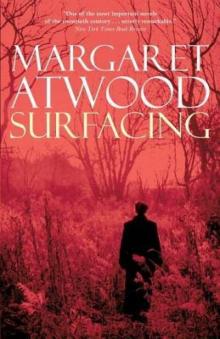 Surfacing
Surfacing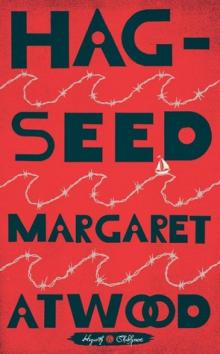 Hag-Seed
Hag-Seed Oryx and Crake
Oryx and Crake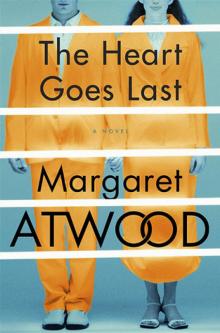 The Heart Goes Last
The Heart Goes Last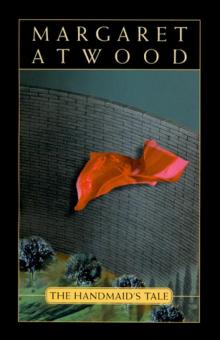 The Handmaid's Tale
The Handmaid's Tale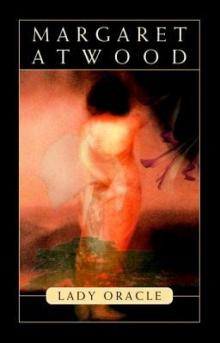 Lady Oracle
Lady Oracle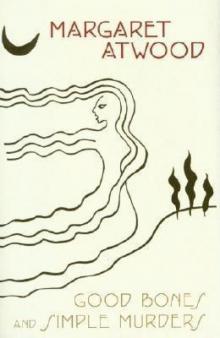 Good Bones and Simple Murders
Good Bones and Simple Murders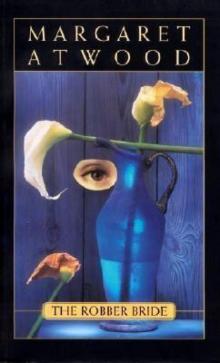 The Robber Bride
The Robber Bride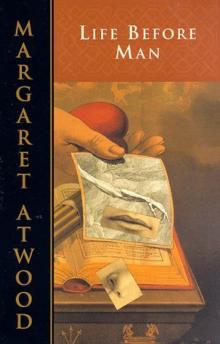 Life Before Man
Life Before Man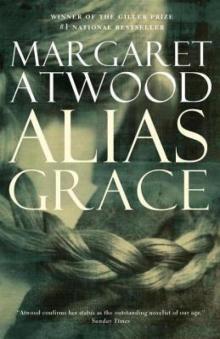 Alias Grace
Alias Grace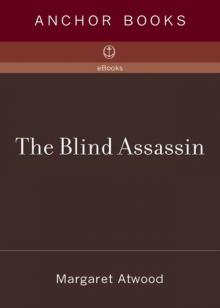 The Blind Assassin
The Blind Assassin Cat's Eye
Cat's Eye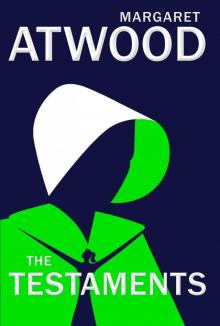 The Testaments
The Testaments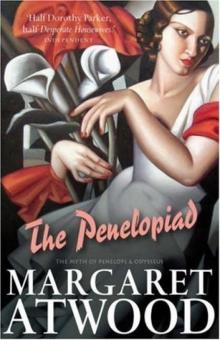 The Penelopiad
The Penelopiad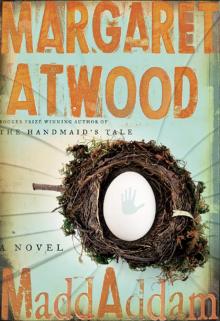 MaddAddam
MaddAddam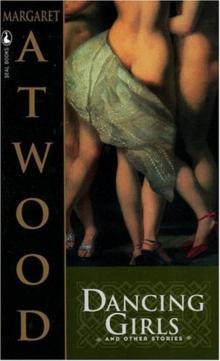 Dancing Girls & Other Stories
Dancing Girls & Other Stories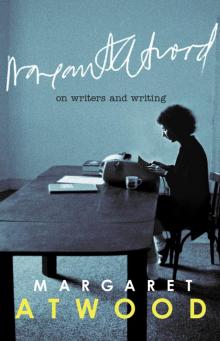 On Writers and Writing
On Writers and Writing Selected Poems II (1976-1986)
Selected Poems II (1976-1986)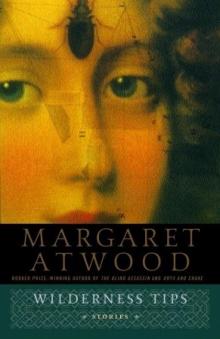 Wilderness Tips
Wilderness Tips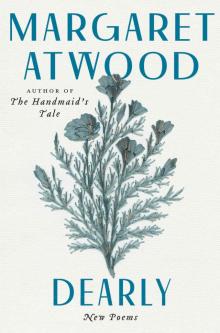 Dearly
Dearly The Tent
The Tent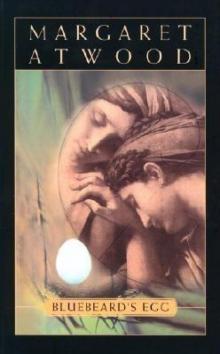 Bluebeard's Egg
Bluebeard's Egg The Edible Woman
The Edible Woman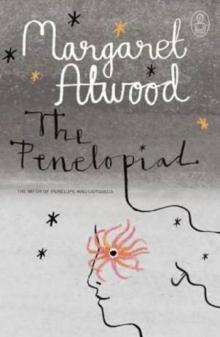 The Penelopiad: The Myth of Penelope and Odysseus
The Penelopiad: The Myth of Penelope and Odysseus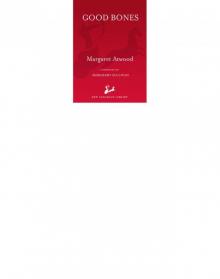 Good Bones
Good Bones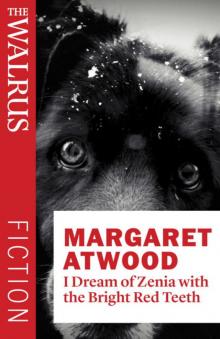 I Dream of Zenia with the Bright Red Teeth
I Dream of Zenia with the Bright Red Teeth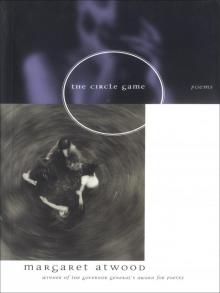 Circle Game
Circle Game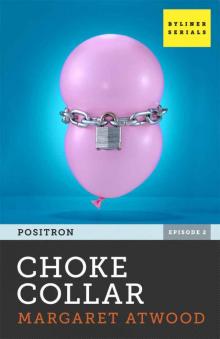 Choke Collar: Positron, Episode Two
Choke Collar: Positron, Episode Two Stone Mattress: Nine Tales
Stone Mattress: Nine Tales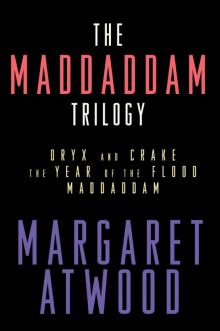 The MaddAddam Trilogy
The MaddAddam Trilogy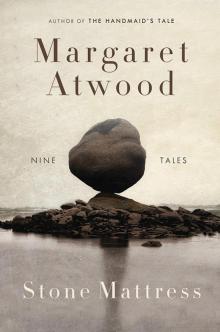 Stone Mattress
Stone Mattress Power Politics
Power Politics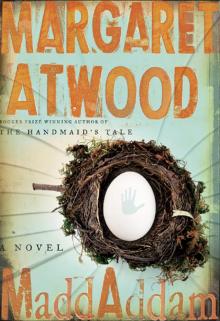 MaddAddam 03 - MaddAddam
MaddAddam 03 - MaddAddam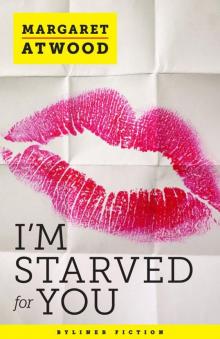 I’m Starved for You (Kindle Single)
I’m Starved for You (Kindle Single) Murder in the Dark
Murder in the Dark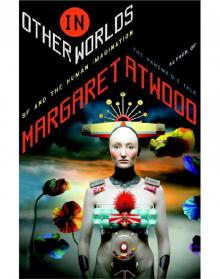 In Other Worlds
In Other Worlds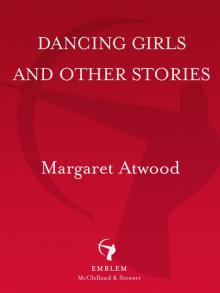 Dancing Girls
Dancing Girls Moral Disorder
Moral Disorder